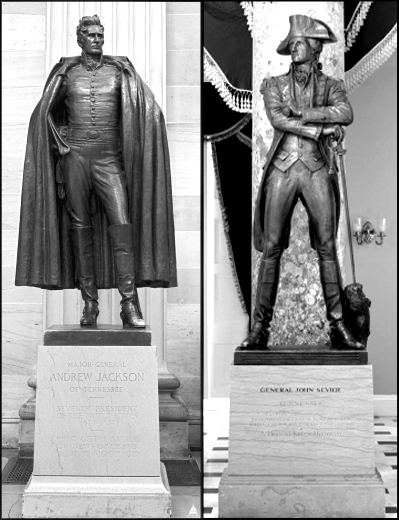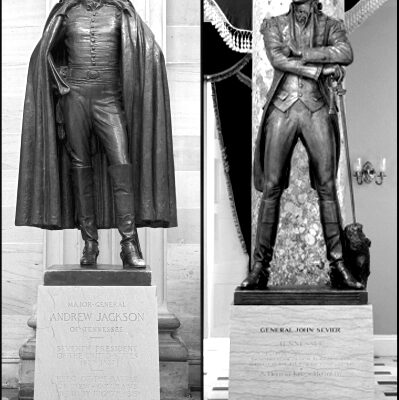If George Washington is considered to be the “Father of our Country,” who then is the “Father of Tennessee?” In spite of all the great men who helped found “The Volunteer State,” the accolades likely belong to John Sevier.
The American soldier, frontiersman, politician and one of the founding fathers of the State of Tennessee was foremost among the pioneers of the territory and arose to a beloved leadership through his bravery, daringness and valor in Indian wars.
In 1913, it was proposed that Tennessee's contribution to Statuary Hall in the Capitol building in Washington DC would be Andrew Jackson and John Sevier. The hall is an impressive chamber devoted to sculptures of prominent Americans. It consists of a large, two-story, semicircular room, located immediately south of the Rotunda, with a second story gallery along the curved perimeter.
 A
A
Andrew Jackson (left) and John Sevier
Concern was raised about one of the two individuals selected. Any youngster raised in the Volunteer State would readily identify Andrew Jackson and his contributions to the state of Tennessee. However, the deciding committee was not so sure about John Sevier, although his credentials were certainly overwhelming. In any event, the choices were Jackson and Sevier and they were selected. Their statues in Statuary Hall are shown in my column photo.
I checked my old seventh grade school book, The Story of Tennessee, by Joseph Parks and Stanley Formsbee, that was used by Miss Dora Huddle, Junior High School's Tennessee history teacher. There were 18 references to Sevier, who was portrayed as a great hero in our state.
The selection of Jackson and Sevier was ironic because the two men became bitter personal and political enemies. The competition was strong between them as each wanted to be the leader in Tennessee affairs. Jackson denounced Sevier for his ignorance of the Constitution and failure to respect the rights of the people. Sevier countered by calling Jackson a “poor pitiful pettifogging lawyer.” In spite of their differences, the fair-minded Governor Sevier appointed Jackson a judge of the Superior Court.
Once the governor of North Carolina picked a quarrel with Sevier and the latter was arrested unjustly and taken to Morgantown to be tried for treason and outlawry. The comrades of Sevier did not sit idly while their chief was being condemned. Instead, they took action.
One night a party of four men – James Crosby, Major Evans and Sevier's two sons, John and James rode up over the mountains through the green fertile valleys and arrived at the edge of the village of Morgantown. Crosby and Evans left the party and, disguised as poor farmers, rode to the courthouse holding the reins of one of Sevier's swiftest horses. When the two arrived, they noted that court was in session; through the open door, they could hear the busy hum of voices within.
Crosby got off his horse, went into the courtroom and approached the judge's bench. He looked his honor squarely and firmly in the face and thundered in a stern voice, “Are you not about through with this man?”
The judge sank into speechless amazement at the man's boldness. The jailers, the spectators, the lawyers – all looked at Crosby not sure what to do. Meanwhile. the bold backwoodsman cast a significant warning glance at Sevier and then at the door. Sevier peeked over and saw his horse pawing the earth expectantly. He knew what to do.
While all eyes were on Crosby and in the confusion of the moment, Sevier quickly, quietly arose and walked briskly out of the room, the bewildered crowd giving way to form a line where he could walk. Once at the door, he gave one bound, landed on his horse and dashed away in a cloud of dust.
“He's gone!” gasped the judge in a dazed manner and looked doubtfully at the sheriff. The confusion deepened and everyone forgot to consider the newcomer who had planned the coup. But this was exactly what Crosby had counted on. He discretely slipped away, found his horse again at the edge of the village and overtook his comrades on the road back to Tennessee.
Sevier continued his services for the cause of the colony and years later was made military governor of the territory of Tennessee by General George Washington.
